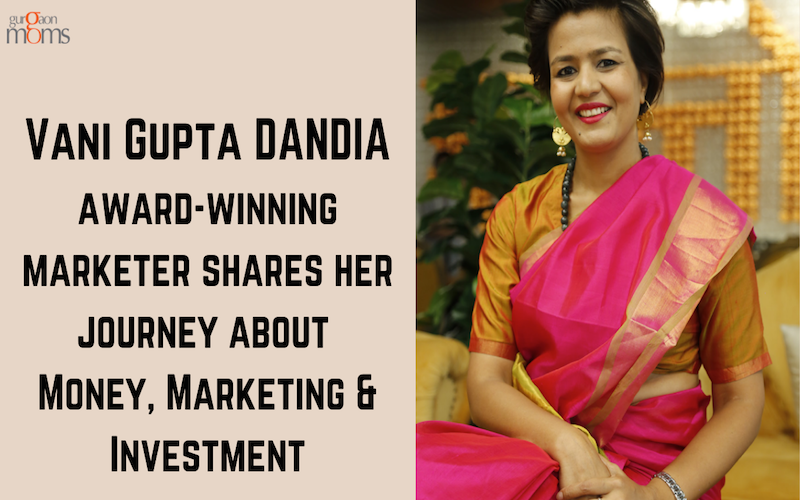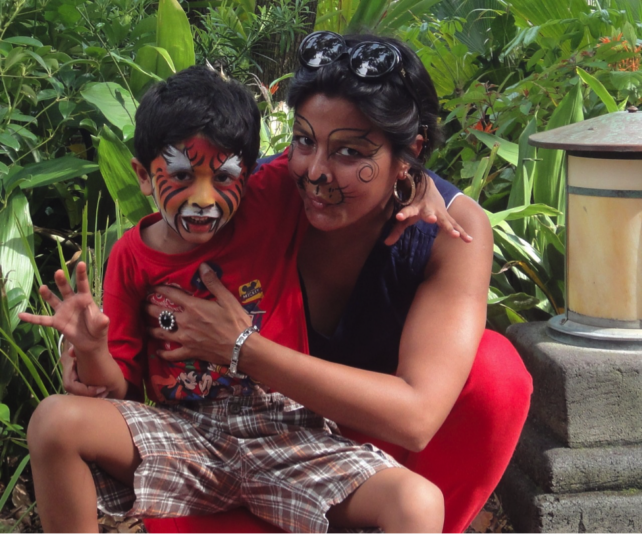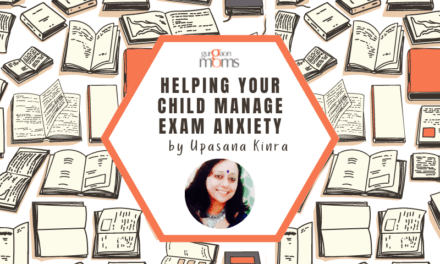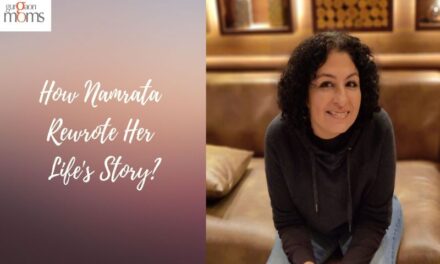Vani Gupta Dandia has worn many hats, be it an award-winning marketer, a Brand Manager, an entrepreneur, or a single mom. Wealthy caught up with her and spoke to her on what she has learned about money, parallels between marketing and investing, and much more.
Hello Vani! Could you please tell us about your background?
I started my career in advertising where I worked on Coca-Cola, Adidas, and Cosmopolitan, and others for about two years. From there, I moved to Henkel and then later to Reckitt-Benckiser where I launched Veet. After that, I shifted to Unilever where I worked on the hair portfolio which included Sunsilk, Clinic All-Clear, and Clinic Plus.
My most exciting stint was at Pepsi where apart from the Quaker Oats and Aliva launches, I headed Kurkure, which was Pepsi’s largest portfolio. Very few marketers have the privilege of doing what I did. For instance, during this one particular year in which we had very little A&M (advertising and marketing) monies, we hired a train from IRCTC for Kurkure Family Express and went around the country.
I am now on my entrepreneurial journey with a marketing consultancy called CherryPeachPlum Growth Partners. Here, I work with young entrepreneurs and young companies and help them deliver their business goals via marketing.
So, tell us about your first paycheque
During my MBA, I did my summer internship with what was then SmithKline Beecham. I opted for an internship in finance which now sounds unbelievable.
I worked on cash management systems for a grand sum of Rs. 4,000 per month. Although I hated the project, my presentation got rave reviews from the then CFO. However, I did admit that I didn’t enjoy the work. The team with whom I worked back then are still close friends of mine. I made new friends but didn’t quite acquire a liking for finance.
In your journey, from an Account Supervisor at Leo Burnett to an independent business consultant today, how has your thinking about money changed?
Earlier, I didn’t make any effort to minimize tax and had a very resigned attitude towards it. I used to feel that jitna hoga utna kat jayega, usme aadmi kya kar sakta hai (the due amount will get deducted and there isn’t much one can do).
With investments, I didn’t have the confidence that I could do anything by myself. For the longest time, I would earn and hand out signed blank cheques to family members with the belief that anyone else could do a better job than me. I never really questioned where my money went and how it was being invested. Now I feel that I could have taken charge of my money at a much younger age. It wasn’t such a big deal and I don’t know why I had such a mental block around it.
In fact, I remember that I never used to check if my salary had come at the end of the month. When my mother called me to ask, I would say, “Of course, it would have come. I am working for a decent company and it is the last thing I need to do.” From there, I have come a long way. Today, I know that money has to be actively managed and that it is not such a big deal.
Somewhere down the line as I was working, I became a single mother and realized that I have to be a lot more careful about my money. It was the first time that I was forced to find out where all my money is parked and ask questions like – How much do I have? Can this grow faster?
That is when I started to reach out to people. If anybody offered any advice, I would ask them, “Achcha, mera statement dekh lo, achcha yeh dekh lo, yeh bata do” (please take a look at my statement, please help me with this).
I decided to get a Wealth Advisor and started asking questions and educating myself. Today, my Wealth Advisor manages a part of my money and I do some part on my own via direct investments. It may not be the best managed, but I certainly feel in control.
What parallels do you see between marketing and investing?
Even though it might sound very generic, I feel marketing must deliver business goals just as wealth management must deliver life goals. I started thinking about it only when my Wealth Advisor asked me some questions, which turned out to be quite an exercise. Essentially, one has to be clear why and for what one is saving money.
We are obsessed with making money for retirement because it has been drilled into our heads conventionally. But it is not just about retirement, it is also about living well now. If you have clarity on when you want to buy the next car, take care of your child’s graduation, or when you want to retire, you will feel so much sorted. Your life won’t feel like this uncertain, let’s say blob, described by jo hoga dekha jayega (we will deal with whatever happens). Putting all of this down somewhere is very comforting.
What popular misconceptions about wealth have you come across?
I believed that money was safest in an FD or a bank account. For the longest time, I didn’t think it could be invested anywhere else. The other misconception I had was that if you were earning well, that should be good enough.
The other misconception was that wealth management is the necessary privilege of the rich and rich alone. I never thought that somebody like me with my paltry money would need a Wealth Advisor; in fact, I would laugh at the idea. But I wish I had started much earlier.
You started your career after the economic liberalization and went on to work with India’s top FMCG firms. How did the conversations around money among people change during this period? At your home, how has it changed from your parents to your next generation?
My parents’ view was that one must earn well, do well at the job, work with good companies, and draw a pension. So having a pensionable job was much-valued. And when you earn the money, you put it in an FD and be regular with your Provident Fund (PF).
Those were the conversations we had around money. Even now, my mother still harbors this wish that I should have pursued teaching as a profession. So that is how I was brought up.
But like I said earlier, my attitude towards money is vastly different today. There was a time when I didn’t know how many bank accounts I had. I would have a few thousand in each account which were too small for anybody to bother. It was a time when I was too scared to look at how much money I had because I didn’t want to discover how little I had! 🙂
Looking back, what decisions or habits around money — be it good or bad — led you to where you are today?
A good habit or attitude was my ambition or “earn-well attitude”. The bad is that it was always governed by ignorance and fear.
I now understand that monthly discipline is critical to making money in the long run. After watching this documentary on Warren Buffett, I was left in awe of how simple he made it sound. He explains it in a way even a five-year-old can get.
You said that you look at Expertise, Objectivity, and Trust in your Wealth Manager? In your interactions with the Wealthy.in, did you get that confidence in your trust parameters?
I think the trust comes from expertise as well as my conversations with the Wealth Managers at Wealthy. I feel it comes from a space of deep research. They have been very generous in sharing their research documents.
Secondly, they also make a lot of proactive calls. For example, if I have had a discussion with them on something, a month later I would get a call from the team reminding me to take action even when Wealthy had little or no incentive. It is comforting to know that there is someone to take care of my financial planning even when they don’t need to do that.
So here is a follow-up question – What do you look for in a Wealth Manager or anyone whom you trust in matters of money?
The first is expertise which must come from research and a breadth of options. It also comes from how much hard work the advisor is ready to put in and the number of scenarios he/she is willing to consider.
Secondly, one can eventually find out whether the person has a vested interest or a genuine concern for your financial health. You can see this in the objectivity, neutrality, or even the proactiveness of the advisor.
That brings us to the most important and most unavoidable question. How has the pandemic changed your approach towards wealth?
Quite surprisingly, I have become more aggressive toward money. I am investing a lot more, especially in equity. Maybe, it comes from a sense that things will only get better once we tide over this period. From whatever little I have understood, this feels like a great time to invest.
I also now have a more disciplined approach toward picking stocks and continuing my SIP.
How did the transition from a successful corporate role to an entrepreneur impact your finances? How did you adjust?
I took the plunge of becoming an entrepreneur only after figuring out how much money I had. I got my investment advisor to make sure that I have enough money to carry on comfortably even if I am not able to make any money for a year or two, say a situation in which I am laid up in bed for a few years. I had the comfort of knowing that I had enough money for an emergency.
As an entrepreneur, I am a lot more careful and active in managing my money because I realize there is no regular paycheck.
What is your current asset allocation?
Equity – 65%, debt -35%
If you had to choose one quote or statement on investing for a wall hanging, what would it be?
“Start small, think big.”







